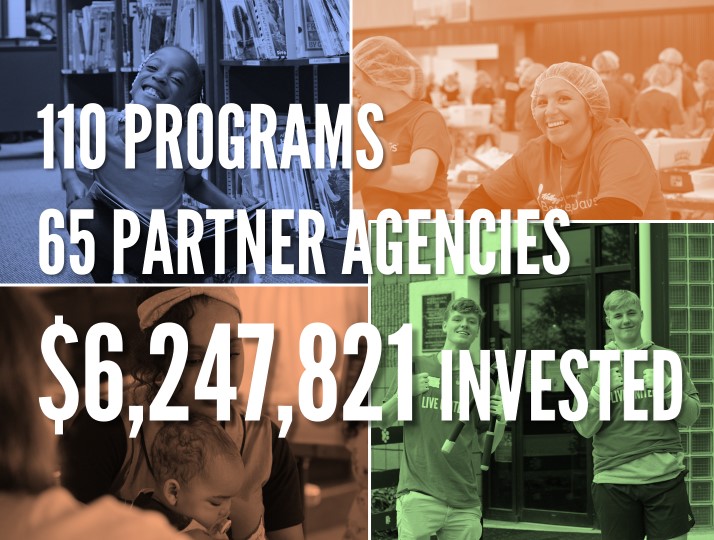Investing for Impact: $6.24 Million in UWBCKR Grants Drives Change
August 14, 2019

Childhood trauma, infant health, stable housing
Sixty programs will receive a total of $3,718,401 in strategic grants annually for three years, according to Alyssa Stewart, Vice President of Impact & Engagement. Grants for innovative, interim/supportive and basic needs programs provide one year of funding to 50 programs, totaling $2,529,420.
“These grants are targeted investments in programs and partners to get at the root of the toughest challenges we face in our regional community,” said Stewart.
In 2016, UWBCKR set 10- and 15-year goals to guide grantmaking. Those goals include:
• Improve high school graduation rates and reduce racial and economic disparities in graduation rates. The measure of success will be a four-year high school graduation rate of 83 percent region-wide by 2030, with a focus on graduation rates for students of color and students from low-income families. Strategic efforts focus on early childhood success and kindergarten readiness, early grade reading proficiency, and the social emotional wellbeing of children.
• Increase the number of economically stable households. As measured by ALICE (Asset Limited, Income Constrained, Employed) standards, UWBCKR seeks to elevate 8,500 households to economic stability by 2030. Strategies center on assuring stable and affordable housing, and providing workforce and income supports—such as access to child care, transportation and financial literacy—for low-income and working people.
• Improve family and infant health while reducing racial and economic disparities. As infant mortality rates are a key measure of a community’s overall health system, UWBCKR set a goal of reducing the infant mortality rate region-wide to 6.0 by 2025—that is, no more than six infant deaths in the first year of life per 1,000 live births. This is an especially urgent need among black families. Efforts will focus on physical, behavioral and mental health for families and infants, and on health education and awareness.
• Ensure a safety net is in place to help individuals and families access basic necessities in times of crisis. Efforts in this area will include making sure people get food, shelter, clothing, transportation, vital records and other basic needs.
Partner Agencies Receive Funds
The new grants go to 65 partner agencies in the Battle Creek and Kalamazoo region, Stewart said. Some programs target needs in specific communities while others encompass the entire region.
According to Stewart, 37 education programs through 26 agencies will receive $1,703,428, or 27.26% of total grants. In income/financial stability, 27 programs through 20 agencies will get $1,155,369, or 18.49%. In health, 21 programs through 13 agencies will receive $1,232,130, or 19.72%. In basic needs, the largest investment area, 25 programs through 24 agencies are getting $1,851,533, or 29.63%. Support for 2-1-1 totals $305,361, or 4.9%.
“We’re proud to work with great partner agencies driving effective programs that are turning the tide in key areas of need,” said Stewart.
To underscore the point, last year UWBCKR released its first-ever impact report showing direct, sustainable results from its investments. That report is available on our website, changethestory.org/impact-report. A new report with updated results is currently in the works.
In addition to these newly funded programs, UWBCKR is a partner in four state and national initiatives, six regional initiatives, 11 initiatives in Battle Creek, and seven in Kalamazoo. These range from policy and poverty efforts to hunger, housing and trauma.
“By leading shared efforts, investing strategically and bringing together the people, resources and ideas that create change, we’re driving impact and transforming lives in lasting ways,” said Chris Sargent, President & CEO of UWBCKR. “It’s exciting to be part of a collective effort that makes a powerful difference.”
For a complete summary of UWBCKR’s new grants, supported programs
![]()
Posted in Basic Needs, BC/Kzoo, BC/Kzoo General, Education, Health, Income
